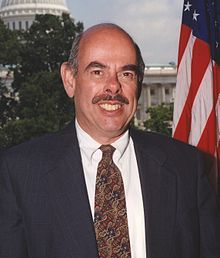
Back هينرى واكسمان ARZ هنری وکسمن AZB Henry Waxman German هنری وکسمن Persian הנרי וקסמן HE Henry Waxman ID Henry Waxman Italian Henricus Waxman Latin Henry Waxman Polish Henry Waxman Serbo-Croatian
Henry Waxman | |
|---|---|
 | |
| Chair of the House Energy Committee | |
| In office January 3, 2009 – January 3, 2011 | |
| Preceded by | John Dingell |
| Succeeded by | Fred Upton |
| Chair of the House Oversight Committee | |
| In office January 3, 2007 – January 3, 2009 | |
| Preceded by | Tom Davis |
| Succeeded by | Edolphus Towns |
| Member of the U.S. House of Representatives from California | |
| In office January 3, 1975 – January 3, 2015 | |
| Preceded by | John Rousselot |
| Succeeded by | Ted Lieu |
| Constituency | 24th district (1975–1993) 29th district (1993–2003) 30th district (2003–2013) 33rd district (2013–2015) |
| Member of the California State Assembly from the 61st district | |
| In office January 6, 1969 – November 30, 1974 | |
| Preceded by | Lester A. McMillan |
| Succeeded by | John L. E. Collier |
| Personal details | |
| Born | Henry Arnold Waxman September 12, 1939 Los Angeles, California, U.S. |
| Political party | Democratic |
| Spouse | Janet Kessler |
| Children | 2 |
| Education | University of California, Los Angeles (BA, JD) |
Henry Arnold Waxman (born September 12, 1939) is an American politician and lobbyist who was a U.S. representative from California from 1975 to 2015. He is a member of the Democratic Party.
His district included much of the western part of the city of Los Angeles, as well as West Hollywood, Santa Monica, and Beverly Hills, and was numbered the 24th district from 1975 to 1993, the 29th district from 1993 to 2003, and the 30th district from 2003 to 2013, changing because of redistricting after the 1990, 2000, and 2010 censuses.
Waxman was an influential liberal member of Congress, and was instrumental in passing laws including the Infant Formula Act of 1980, the Orphan Drug Act of 1983, the Drug Price Competition and Patent Term Restoration Act of 1984, the Clean Air Act of 1990, the Ryan White CARE Act of 1990, the Food Quality Protection Act of 1996, the State Children's Health Insurance Program of 1997, the Postal Accountability and Enhancement Act of 2006, the Family Smoking Prevention and Tobacco Control Act of 2009, and the Patient Protection and Affordable Care Act of 2010.[1][2][3] In 1985, he played an instrumental role in banning federal funding for the Red Line subway in Los Angeles so that it would not go into his affluent Westside district.[4][5]
He is currently chairman at Waxman Strategies, a D.C.-based lobbying firm,[6] Regent Lecturer for University of California, Los Angeles, and lecturer at the Johns Hopkins Bloomberg School of Public Health.[7]
- ^ Jonathan Wiseman (January 30, 2014). "Henry Waxman, Key Democrat and Force for Health Care Law, Is to Retire". The New York Times. Retrieved February 14, 2014.
- ^ Karen Tumulty (January 30, 2014). "Henry Waxman to retire at end of congressional session". The Washington Post. Retrieved February 14, 2014.
- ^ Jonathan Cohn (January 31, 2014). "Farewell to Henry Waxman, a Liberal Hero". The New Republic. Retrieved February 14, 2014.
- ^ Elkind, Ethan N. (2014). Railtown: The Fight for the Los Angeles Metro Rail and the Future of the City. University of California Press. pp. 1–2. ISBN 978-0-520-27827-1. JSTOR 10.1525/j.ctt5hjhqt.
- ^ Broverman, Neal (April 13, 2012). "Eighties Subway-Staller Henry Waxman Enters Purple Line Fray". Curbed LA.
- ^ Mario Trujillo (June 9, 2015). "Former Rep. Waxman lobbying for T-Mobile". The Hill. Washington, D. C.
- ^ "Waxman Strategies". waxmanstrategies.com.